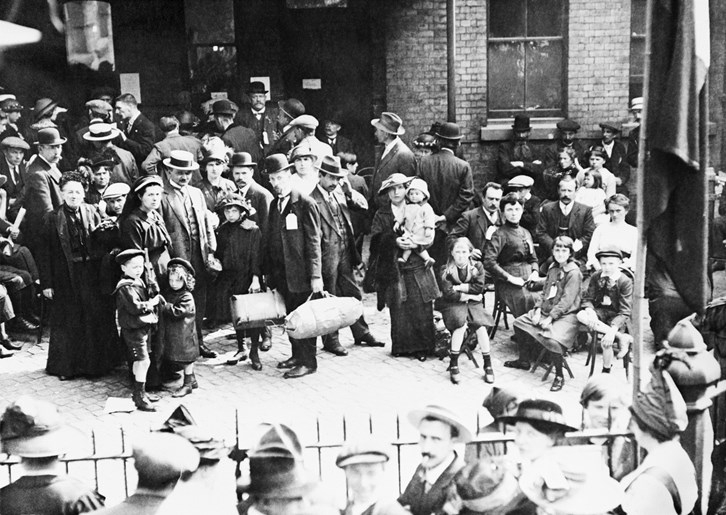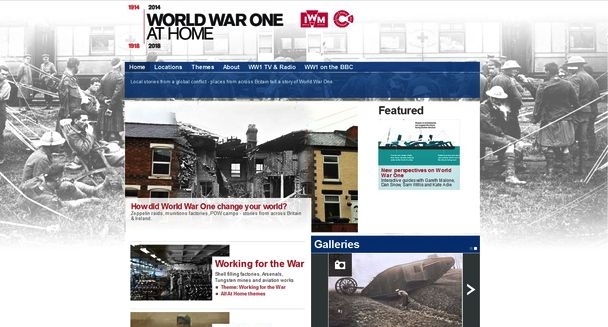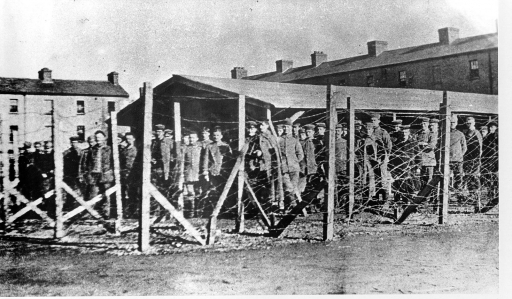The BBC has given a taste of some of the stories about life on the home front which will feature in a major First World War series running on all BBC local radio stations and regional television news programmes.
Starting on 24 February 2014, World War One At Home will tell more than 1,000 personal stories of how people across the UK faced the tragedies and challenges of the conflict.
All will be linked to specific places, many featuring footage that has never been seen before.
Craig Henderson, Head of Programmes, BBC English Regions, said: “These stories offer a unique insight into life on the Home Front 100 years ago. They reveal familiar places across the nation in a new and fascinating light, places that we might drive or walk past every day without realising their historical resonance.”
Refugees, POWs and Land Girls
BBC Radio Manchester brings up-to-date the story of young Percy Morter who enlisted in 1914 at the Palace Theatre Manchester, when the music hall star, Vesta Tilley, placed her hand on his shoulder as part of a recruiting campaign. Percy died on the Somme nearly a year later. His body was never found and he is remembered on a memorial in east Manchester. His wife Kitty was pregnant, and her son was born in October of that year. Kitty said she couldn’t remember the baby being born as she’d no wish to live because her world had come to an end.
BBC London reveals how a make-shift refugee centre in Earls Court became home for thousands of fleeing Belgium nationals. Of the 250,000 refugees who fled their homes following Germany’s invasion of Belgium in August 1914, many came through ports such as Folkestone and Tilbury before moving to other parts of the British Isles. In London, they were processed in huge encampments, including Earls Court and Alexandra Palace, or they were housed with families across London.

Belgian refugees arriving at Victoria Station, London. Image courtesy of Imperial War Museum
BBC Hereford & Worcester recounts the tragic story of a charity concert held in April 1916 to raise money to buy gifts for the members of the Herefordshire Regiment who were serving in Gallipoli. There were 40 performers, mainly young girls whose fathers were serving in the regiment. The theme was Winter Wonderland and the girls were dressed as Eskimos and snow maidens in costumes made of cotton wool. A fire started, rumoured to be from the spark of a discarded cigarette, and the costumes caught fire. Six girls died on the night and two died later of their injuries.
BBC Radio Ulster and BBC Radio Foyle tell how Templemore Barracks in County Tipperary housed some of the first German POWs shortly after the opening shots of the First World War were fired. Templemore is now the training college for the Irish Police, (Garda Siochana). More than 2,000 military prisoners were held in makeshift camps there from September 1914 to March 1915. While the Western Front observed its own truces over Christmas 1914, in Tipperary the locals and POWs exchanged gifts through barbed wire fences as the Germans sang carols in their native tongue.
Good Morning Scotland, the John Beattie Show and Newsdrive on BBC Radio Scotland tell the story of Mary Barbour and the Glasgow Rent Strikes. Barbour raised an army of housewives, engineers and labourers to protest at rent increases imposed on them by landlords while loved ones were loyally fighting overseas. After months of protests and increasingly militant resistance, the government of the day was forced to act and improve the lives of tenants across the whole of Britain.
On BBC Radio Wales, “A Land Girl in the City” looks at the work of land girls in the women’s land army from 1914-1918 and features archive recording with Agnes Greatorex who worked at Green Farm in Cardiff. The building, now owned by Cardiff County Council, was restored in keeping with the original farmhouse and is in use today as a hostel. The debt Britain owed the women who kept the country’s farms going during the First World War was huge. The hours were long, the conditions dirty and the work excruciatingly hard. Land girls, also known as the forgotten army, made a unique contribution to the war effort, without which an embattled country would have faced starvation.
BBC Online will launch 230 World War One at Home stories on 24 February, with hundreds more following later this year.

The schedule
*All BBC Local Radio stations across England will broadcast a World War One At Home story at 8.15am each weekday morning, and at various times throughout the day from Monday 24 February to Friday 28 February. More World War One At Home stories will be broadcast in April and through the rest of the year.
*BBC regional television news programmes in England will broadcast a World War One At Home story each weekday from 24 – 28 February at 6.30pm on BBC One. Many of the stories will feature never before seen footage of life on the Home Front.
*In Scotland, World War One At Home stories will be on Good Morning Scotland, the John Beattie Show and Newsdrive on BBC Radio Scotland from Monday 24 to Thursday 27 February.
*In Northern Ireland, World War One At Home stories will be at 8.50am, 11.55am and 11.55pm on BBC Radio Ulster and BBC Radio Foyle from Monday 24 to Friday 28 February.
*In Wales, World War One At Home stories will be on Eleri Sion’s programme at 3.30pm Monday 24 to Thursday 27 February and Friday 28 February on Wynne Evans’s Big Welsh Weekend at 3.30pm on BBC Radio Wales.
Each story broadcast on radio and TV will be available to listen to online and the audience will be able to browse stories from across the UK, Ireland and the Channel islands, to find out how their area’s experience contrasted with those elsewhere, and discover the nationwide experience of the home front.
The BBC’s Craig Henderson said: “These stories would have remained little-known without the involvement of the many partners and organisations across the country who have supported our journalists in bringing them to light, and I would like to thank them for their invaluable help and expertise.”
The project, part of the BBC’s World War One Centenary season, is being produced in partnership with the Imperial War Museum and academics from British universities supported by the Arts and Humanities Research Council.
In total, World War One at Home will broadcast 1,400 stories in phases, the second of them starting in Spring 2014.
Hundreds of stories can be browsed online from 24 February.
Source: BBC Nations and Regions
Date of press release publication: 18th February 2014
Images courtesy of John Redmond, Imperial War Museum and the BBC.
Posted by: Peter Alhadeff, Centenary News
